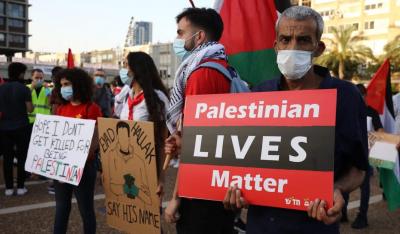
Mass rally in Tel Aviv against West Bank annexation

A joint Jewish-Palestinian rally against Israeli plans for annexation of West Bank settlements drew thousands to Tel Aviv's Rabin Square on June 6. The protest was originally forbidden by the authorities due to fears over the coronavirus, but police relented and issued a permit the previous night. Organizers took measures to ensure that "distancing" regulations were observed. Vermont Sen. Bernie Sanders addressed the rally via video conference, saying he was "heartened" to see Arabs and Jews demonstrating together. "The plans to annex any parts of the West Bank must be stopped," he stated. "The occupation must be ended and we must work together for a future of equality and dignity for all people in Israel and Palestine."
In an unsubtle reference to Donald Trump and Benjamin Netanyahu, Sanders added, "It's up to all of us to stand up to authoritarian leaders and to build a peaceful future for every Palestinian and every Israeli."
Ayman Odeh, head of the Joint List of Arab-led parties, told the crowd, "We are at a crossroads. One path leads to a joint society with a real democracy, civil and national equality for Arab citizens... The second path leads to hatred, violence, annexation and apartheid. We're here in Rabin Square to pick the first path." (Haaretz, ToI)
Many protesters held signs demanding justice in the case of Eyad Hallaq, an unarmed 32-year-old Palestinian with severe autism who was shot and killed by Israeli police in Jerusalem on May 30. Border Police said officers thought he was carrying a gun, and he failed to stop when ordered to do so. Protests have been held over the killing in Jerusalem, Haifa and Jaffa, drawing the connection to the #BlackLivesMatter protests in the US. (+972, Haaretz, AP)
In a tentative setback for annexation plans, Israel's Supreme Court on June 9 overturned a 2017 law that legalized settler homes built on privately owned Palestinian land in the West Bank. Under the "Law for the Regularization of Settlement in Judea and Samaria," approved in February 2017, settlers were allowed to remain on such lands if they did not have prior knowledge of Palestinian ownership. Settlers were also allowed to build on the land if they received government approval. The law retroactively legalized more than 4,000 homes built in the West Bank, and allowed some 50 more to be built with government approval.
A nine-judge panel of the high court struck down the law, with only one vote dissenting. The judges found that the law "unequally infringes on the property rights of Palestinian residents while giving preference to the proprietary interests of Israeli settlers." (Jurist)
